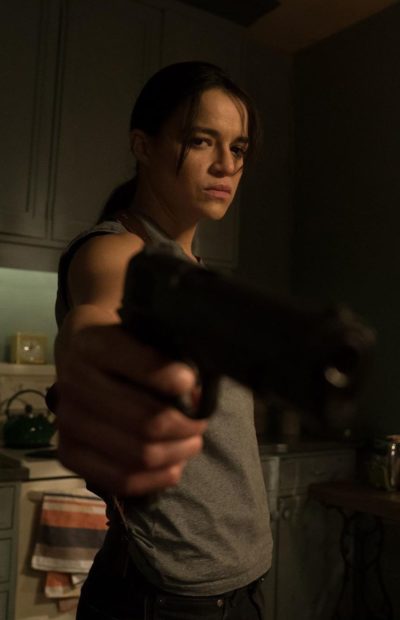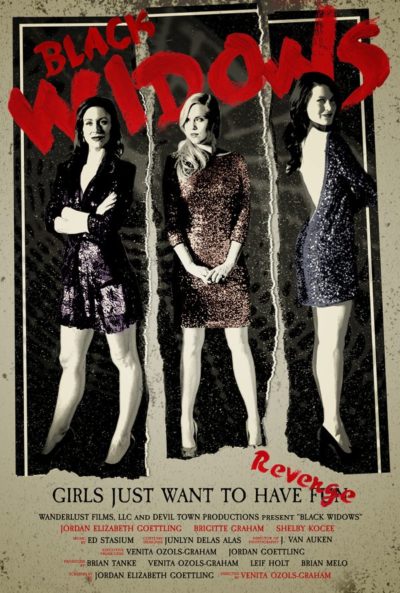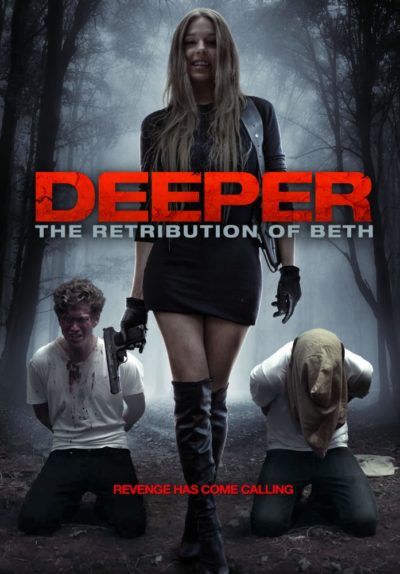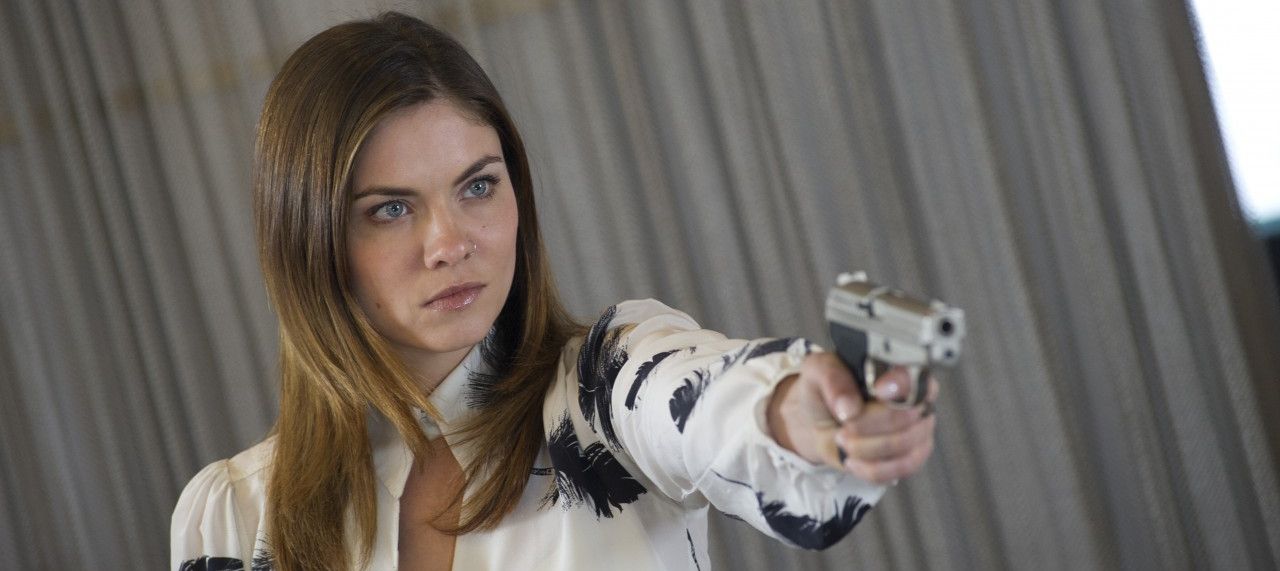★★★
“When good yoga instructors… GO BAD.”
 Yoga instructor May (Biel) is delighted when she finally tracks down her long-lost biological sister, Shiva (Mamet) whom she has never met. However, the reunion is soured because May discovers the abusive relationship in which Shiva is embroiled. Worse is to come, as she finds out that Shiva is actually a hooker, and her significant other, Cody (Anderson), is more pimp than boyfriend. May’s efforts to help her sibling run into stormy water – not just from Cody, but also her own boyfriend, Dex (Gathegi) and adopted mother, who think Shiva and Cody are just shaking May down. Eventually, the point comes where May has to come out of this middle-class comfort-zone, because the downward dog position isn’t going to help her and Shiva escape their increasingly perilous situation.
Yoga instructor May (Biel) is delighted when she finally tracks down her long-lost biological sister, Shiva (Mamet) whom she has never met. However, the reunion is soured because May discovers the abusive relationship in which Shiva is embroiled. Worse is to come, as she finds out that Shiva is actually a hooker, and her significant other, Cody (Anderson), is more pimp than boyfriend. May’s efforts to help her sibling run into stormy water – not just from Cody, but also her own boyfriend, Dex (Gathegi) and adopted mother, who think Shiva and Cody are just shaking May down. Eventually, the point comes where May has to come out of this middle-class comfort-zone, because the downward dog position isn’t going to help her and Shiva escape their increasingly perilous situation.
As director Bell – herself, once a yoga teacher – put it: “It’s easy to be peaceful and feel blessed when everyone around you is like that. But… what is the correct choice, when confronted with someone who doesn’t want to sit down and have peaceful talks?” For it’s a relatively uncommon, even subversive, idea proposed here, especially in a Californian indie film [although Bell is a fellow Scot, the setting here is 100% Los Angeles]. While non-violence is clearly preferable, any realist must admit, it’s not necessarily the solution to every problem, and there are times when more direct action is not only justified – it’s required. It’s also interesting that both the conventionally villainous Cody and “nice guy” Dex are portrayed as controlling their women: one physically, the other psychologically.
I guess “interesting” is a good word to sum this up in general – it’ll make you think, rather than feel. Not that there’s anything wrong with thoughtful film-making as a concept. It’s just that the particular topic is one which should affect the viewer on a gut level. I kept thinking, “Is this the scene which will make me angry?”, and it never quite gets there, with my emotional needle failing to go past “somewhat annoyed.” It’s perhaps partly a result of the two leads being almost stereotypical in their lives: May, in particular, embodies just about every trope of the happy hippie chick.
The film becomes rather more satisfying after she realizes that pacifism and chanting are not going to address this particular problem. Especially amusing is the scene in which she bursts into the house where Shiva is working, ending in May bidding the client farewell with a cheery, “Namaste, motherfucker.” It’s a cheap shot, for sure, yet it worked for me. More of this intensity would be welcome, though since we enjoyed her in Blade: Trinity, Biel’s credible performance as a bad-ass didn’t come as a particular surprise. The trailer and cover do pull something of a bait and switch, significantly emphasizing the thriller elements over the dramatic ones. However, I can’t confess to feeling cheated: what it provides over and above expectations, balances out those shortcomings, and the venture proves to be a satisfactory overall experience.
Dir: Diane Bell
Star: Jessica Biel, Zosia Mamet, Joe Anderson, Edi Gathegi






 I’m a big fan of any film with an outrageous premise, and this one certainly delivers. Mob hitman Frank Kitchen (Rodriguez) carries out his latest job with no qualms, killing a debtor. What he doesn’t realize is, the victim’s sister is a talented but EXTREMELY twisted surgeon, Dr. Rachel Jane (Weaver). She vows to take revenge on Frank by removing what she feels matters most to him: his masculinity. Kitchen is knocked out, kidnapped, and wakes up in a seedy hotel room, to find herself in possession of a couple of things she didn’t have before, and missing something she used to have. But gender reassignment does not make the (wo)man, and an extremely pissed-off Frank vows revenge of her own, both on Jane and Honest John Hartunian (LaPaglia), the former employer who betrayed Kitchen.
I’m a big fan of any film with an outrageous premise, and this one certainly delivers. Mob hitman Frank Kitchen (Rodriguez) carries out his latest job with no qualms, killing a debtor. What he doesn’t realize is, the victim’s sister is a talented but EXTREMELY twisted surgeon, Dr. Rachel Jane (Weaver). She vows to take revenge on Frank by removing what she feels matters most to him: his masculinity. Kitchen is knocked out, kidnapped, and wakes up in a seedy hotel room, to find herself in possession of a couple of things she didn’t have before, and missing something she used to have. But gender reassignment does not make the (wo)man, and an extremely pissed-off Frank vows revenge of her own, both on Jane and Honest John Hartunian (LaPaglia), the former employer who betrayed Kitchen. Three women friends – Darcy (Elizabeth), Nora (Graham) and Olivia (Kocee) – are all having shitty luck with their relationships. Olivia is in the middle of an ugly divorce from Adam. Nora’s boyfriend Ryan is a control freak. And while Darcy’s new friend Blair (Brown) initially seems fine, he turns out to be the worst of them all. After he refuses to take no for an answer, the trio decide revenge is a dish best served naked in the middle of the desert. Unfortunately for him, Blair ends up lacking a pulse. Unfortunately for the film, it takes forever to get to this point, and for the vast majority of its running-time the promised “dark comedy” is neither dark nor comedic.
Three women friends – Darcy (Elizabeth), Nora (Graham) and Olivia (Kocee) – are all having shitty luck with their relationships. Olivia is in the middle of an ugly divorce from Adam. Nora’s boyfriend Ryan is a control freak. And while Darcy’s new friend Blair (Brown) initially seems fine, he turns out to be the worst of them all. After he refuses to take no for an answer, the trio decide revenge is a dish best served naked in the middle of the desert. Unfortunately for him, Blair ends up lacking a pulse. Unfortunately for the film, it takes forever to get to this point, and for the vast majority of its running-time the promised “dark comedy” is neither dark nor comedic. Investigative journalist Mark (Anderson) is not too happy about his latest investigative assignment: going on a ride-along with Steve (Francis), the sleazy owner of porn company “XBus”. He picks up girls on the street and supposedly, talks them into getting naked for his website, Girls Gone Wild-style. But Steve’s latest predatory mission doesn’t go as planned, after picking up the very lovely Beth (Sam) and her friend Sam (Gatien). For Beth pulls a gun, hijacks the limo, and drives the two men into the forests on the outskirts of town, clearly with savage vengeance on her mind for an incident in her – and Steve’s – past. Not quite the story Mark anticipated getting.
Investigative journalist Mark (Anderson) is not too happy about his latest investigative assignment: going on a ride-along with Steve (Francis), the sleazy owner of porn company “XBus”. He picks up girls on the street and supposedly, talks them into getting naked for his website, Girls Gone Wild-style. But Steve’s latest predatory mission doesn’t go as planned, after picking up the very lovely Beth (Sam) and her friend Sam (Gatien). For Beth pulls a gun, hijacks the limo, and drives the two men into the forests on the outskirts of town, clearly with savage vengeance on her mind for an incident in her – and Steve’s – past. Not quite the story Mark anticipated getting. There are times when a film doesn’t deliver anything close to what the sleeve promises. This would be one of those times. However, in this case, while disappointed, I can’t claim it was an entire waste of my time. Or, at least, it wasn’t a waste of very
There are times when a film doesn’t deliver anything close to what the sleeve promises. This would be one of those times. However, in this case, while disappointed, I can’t claim it was an entire waste of my time. Or, at least, it wasn’t a waste of very  Teetering on the edge of qualifying as false information, this TVM was originally released under the more relevant, yet great deal less salacious (and, let’s be honest, less appealing) title of A Nanny’s Revenge, along with a greatly subdued sleeve. Marketing works, people: for put it this way, I’d never have watched it in that presentation. I can’t feel
Teetering on the edge of qualifying as false information, this TVM was originally released under the more relevant, yet great deal less salacious (and, let’s be honest, less appealing) title of A Nanny’s Revenge, along with a greatly subdued sleeve. Marketing works, people: for put it this way, I’d never have watched it in that presentation. I can’t feel 
 I think it’s the “poorly written” aspect which I find most offensive. For I’m entirely down for some good ol’ entertainment in the form of justified violence, from Dirty Harry through Ms. 45 to Starship Troopers. But this… Oh, dear. The most stunning thing was discovering that this was the first in a series of twenty-seven novels in the “Sisterhood” series. Twenty-seven. I guess this proves there’s a market for this kind of thing, though I am completely at a loss as to who it might be. It certainly isn’t me.
I think it’s the “poorly written” aspect which I find most offensive. For I’m entirely down for some good ol’ entertainment in the form of justified violence, from Dirty Harry through Ms. 45 to Starship Troopers. But this… Oh, dear. The most stunning thing was discovering that this was the first in a series of twenty-seven novels in the “Sisterhood” series. Twenty-seven. I guess this proves there’s a market for this kind of thing, though I am completely at a loss as to who it might be. It certainly isn’t me. Like much horror, the rape-revenge genre is one which overlaps with, rather than being wholly encompassed by, the action-heroine field. Some entries qualify: the awesome glory which is Ms. 45 being the most obvious example. But others appear to focus more on the rape than the revenge, and are far less interesting as a result. Such was the case for the first two entries in this series – and, indeed, the 1978 grindhouse classic which it rebooted. Here, however, in an interesting twist we bypass the assault entirely. This starts instead with the victim in the earlier movies (Butler) having adopted a new identity, that of Angela, and attending both one-on-one therapy as well as group sessions.
Like much horror, the rape-revenge genre is one which overlaps with, rather than being wholly encompassed by, the action-heroine field. Some entries qualify: the awesome glory which is Ms. 45 being the most obvious example. But others appear to focus more on the rape than the revenge, and are far less interesting as a result. Such was the case for the first two entries in this series – and, indeed, the 1978 grindhouse classic which it rebooted. Here, however, in an interesting twist we bypass the assault entirely. This starts instead with the victim in the earlier movies (Butler) having adopted a new identity, that of Angela, and attending both one-on-one therapy as well as group sessions. The results of bringing female MMA fighters to the screen have been a bit mixed, shall we say. Gina Carano has looked decent in her films, but Ronda Rousey’s performances have been roundly criticized, and her Mile 22 project appears dead in the water. The performance by the recently retired from MMA Miesha Tate, which is likely the film’s major selling-point, rates… somewhere in the middle. She doesn’t disgrace herself – but that may be partly because there is no shortage of other weaknesses to criticize here. Tate is convincing in her role – yet since she’s playing a mixed martial-artist, it’s hardly proof of any acting ability. But I guess, everyone has to start somewhere, and a thinly-disguised version of yourself is a good place to begin.
The results of bringing female MMA fighters to the screen have been a bit mixed, shall we say. Gina Carano has looked decent in her films, but Ronda Rousey’s performances have been roundly criticized, and her Mile 22 project appears dead in the water. The performance by the recently retired from MMA Miesha Tate, which is likely the film’s major selling-point, rates… somewhere in the middle. She doesn’t disgrace herself – but that may be partly because there is no shortage of other weaknesses to criticize here. Tate is convincing in her role – yet since she’s playing a mixed martial-artist, it’s hardly proof of any acting ability. But I guess, everyone has to start somewhere, and a thinly-disguised version of yourself is a good place to begin.